

A parenting style refers to the strategies parents use to nurture their children based on the work of Diana Baumrind, a developmental psychologist at the University of California at Berkeley. In her research, "Baumrind's parenting typology", she identified parenting styles into 4 categories; Authoritative, Authoritarian, Permissive and Neglectful. What Is Authoritative Parenting? Authoritative parenting is characterized by reasonable demands and high responsiveness.
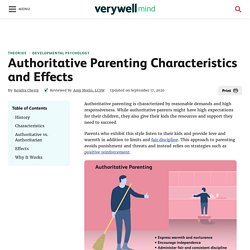
While authoritative parents might have high expectations for their children, they also give their kids the resources and support they need to succeed. Parents who exhibit this style listen to their kids and provide love and warmth in addition to limits and fair discipline. What Is Authoritative Parenting? [With Examples] - ParentingForBrain. WHAT IS AUTHORITATIVE PARENTING? The Definition of Authoritarian Parenting. Authoritarian parenting is a parenting style characterized by high demands and low responsiveness.
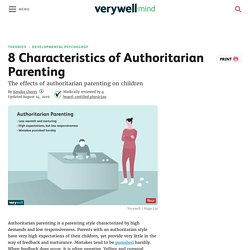
Parents with an authoritarian style have very high expectations of their children, yet provide very little in the way of feedback and nurturance. Mistakes tend to be punished harshly. When feedback does occur, it is often negative. Yelling and corporal punishment are also commonly seen in the authoritarian style. Brief History During the 1960s, developmental psychologist Diana Baumrind described three different types of parenting styles based on her research with preschool-age children.
Authoritarian Parenting (Tough Love Parenting) - ParentingForBrain. Parenting Style Authoritarian Parenting. What Is Permissive Parenting? Permissive Parenting - Why Indulgent Parenting Is Bad For Your Child - ParentingForBrain.
Are You a Permissive Parent? Uninvolved Parenting Style - Traits And Effects on Children. Uninvolved or neglectful parenting is a considerably new parenting style that does away with hand-holding and guiding the children.
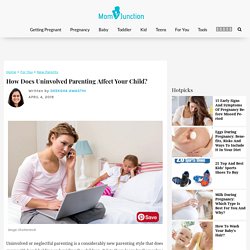
It lets them learn by themselves. Parents could be uninvolved in varying degrees. While most parents look after the basic needs such as food and shelter for their kids, some others neglect their children completely. Characteristics and Effects of Uninvolved Parenting. Emotionally Neglectful Parents. Are you a helicopter parent? - TODAYonline. SINGAPORE — There has been quite a lot of talk about "helicopter parenting", or cosseting, in recent years - so much so that the Ministry of Education (MOE) even shared a post about it on Facebook earlier this month.
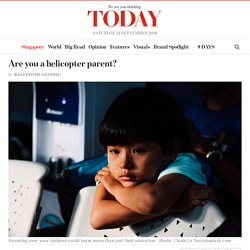
The post linked to an article on MOE's online publication, Schoolbag.sg, which contained illustrations and examples of "helicoptering". These include situations such as bargaining with the child's teacher to give him one more mark so the child can go one grade up, doing the child's project for him instead of letting him do it himself, and "flying" to school with the child's homework when he forgets to bring it with him.
But what is the exact definition of helicopter parenting? Dr Lim Boon Leng, a psychiatrist at Gleneagles Hospital, calls the phenomenon "a maladaptive type of parenting" in which the parent is "overprotective, hovers around the child, and gets involved in his affairs and activities excessively". The MOE added some cautionary remarks on its website. They occur. How Tiger Moms and hovering parents can damage a child’s ability to cope with life’s challenges. Even if you were horrified at the idea of hovering over your child as Amy Chua did in her polarising 2011 bestseller Battle Hymn of the Tiger Mother, I’m betting there was a part of you that looked at her perfect children with at least a tinge of envy.
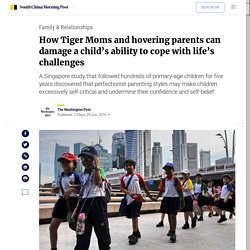
As portrayed in the book, Chua’s magic formula of no play dates, no TV and always being No. 1 in everything (except for gym and drama, of course) ended up producing two girls who were straight-A students and who also were wildly talented in music. Oh, and they both ended up going to Harvard University.
Critics predicted that daughters Sophia and Lulu would end up being “mentally ill, friendless robots”, according to a recent “where are they now” profile in The Telegraph in the UK. Instead, they ended up being “polite, modest and thoughtful” as well as successful, the article says, and they remember their childhood as tough – but happy. But are the sisters the norm or exception to this type of parenting?
Tiger mums, helicopter parents and modern child-rearing angst, Opinion News. Growing up in the 1960s and 70s, I had what could be accurately called a carefree childhood.
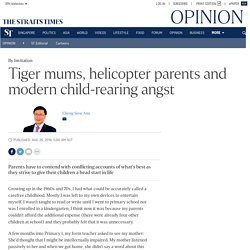
Mostly I was left to my own devices to entertain myself. I wasn't taught to read or write until I went to primary school nor was I enrolled in a kindergarten; I think now it was because my parents couldn't afford the additional expense (there were already four other children at school) and they probably felt that it was unnecessary. A few months into Primary 1, my form teacher asked to see my mother: She'd thought that I might be intellectually impaired. Tailor parenting style to your child, Latest Singapore News.
"At the time, I chafed at such rigid structures...
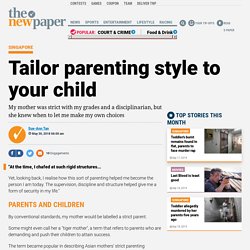
Yet, looking back, I realise how this sort of parenting helped me become the person I am today. The supervision, discipline and structure helped give me a form of security in my life. " By conventional standards, my mother would be labelled a strict parent. Many Singaporeans’ parenting style not helping children succeed - TODAYonline. I was disturbed to read the report “MP proposes piloting cluster of schools without exams, streaming” (Jan 22).
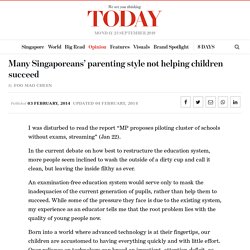
In the current debate on how best to restructure the education system, more people seem inclined to wash the outside of a dirty cup and call it clean, but leaving the inside filthy as ever. An examination-free education system would serve only to mask the inadequacies of the current generation of pupils, rather than help them to succeed. While some of the pressure they face is due to the existing system, my experience as an educator tells me that the root problem lies with the quality of young people now.
Born into a world where advanced technology is at their fingertips, our children are accustomed to having everything quickly and with little effort. Over-reliance on technology can breed an impatient, attention-deficit, as well as mentally and physically slothful generation who cannot cope with anything that requires them to sit for hours to concentrate. Thanks mum for not being a helicopter parent. SINGAPORE: Growing up, my mother, who worked a 12-hour shift in retail, wasn’t a prominent figure at home.
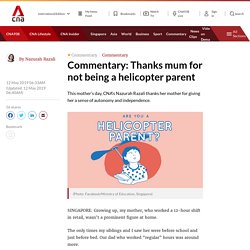
The only times my siblings and I saw her were before school and just before bed. Our dad who worked “regular” hours was around more. Still, she was fully involved in our childhood. Before leaving for work, she’ll prepare lunch for us to eat after school. At work, she answered our calls – even for a short while. I wouldn’t be telling the truth if I said I wasn’t bothered by her absence then. It wasn’t until I was older that I understood the trade-offs. Busy with their jobs, my dual-income parents were unintentionally less involved in school matters. It may go against the grain of contemporary conventional parenting advice, which has led in more cases to many getting heavily involved in their children's lives, but the autonomy my parents gave us allowed me to escape the academic pressures many of my peers had to face.